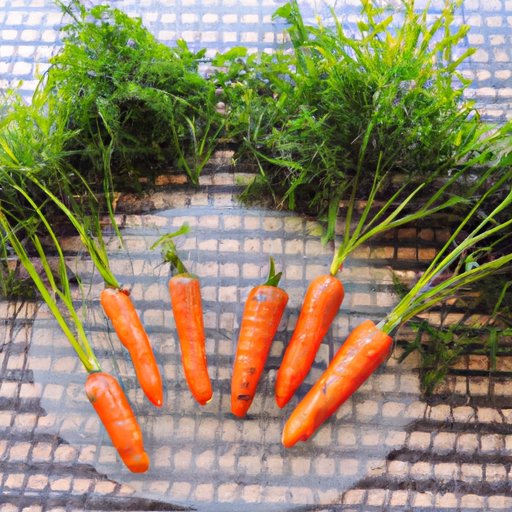
Can You Eat the Greens of Carrots?
Carrots are a staple in many diets and are known for their high levels of beta carotene, but what about their greens? It’s a common question whether it’s safe to consume carrot greens, as they can often be overlooked or even thrown out. In this article, we will explore the nutritional benefits of carrot greens, delicious recipes to incorporate them into your meals, preparation tips, their environmental impact and how to safely consume them.
Nutritional Benefits of Carrot Greens
Carrot greens are often discarded without realizing that they are rich in nutrients. They are packed with vitamin K, which supports bone and heart health, and antioxidants that protect against inflammation, cancer, and heart disease. They also contain vitamins A and C, as well as minerals such as calcium and potassium.
Carrot greens are also an excellent source of fiber, which aids digestion and promotes a feeling of fullness, making it an ideal ingredient in weight loss diets. Consuming carrot greens can help lower cholesterol and improve overall cardiovascular health.
Delicious Recipes Using Carrot Greens
Carrot greens can be used in a variety of recipes, and some innovative ways to incorporate them are in healthy salads, hearty soups, flavorful pesto, or smoothies. Here are a few recipe ideas:
Carrot Greens and Avocado Salad
- 2 cups washed and chopped carrot greens
- 1 avocado, diced
- ¼ cup chopped pecans
- 1 small red onion, diced
- 2 tablespoons olive oil
- 1 tablespoon honey
- 1 tablespoon apple cider vinegar
- ½ teaspoon salt
- 1 lemon’s zest
Instructions:
- Combine all ingredients in a large bowl.
- Toss to combine, and serve chilled.
Carrot Greens and Walnut Pesto
- 2 cups chopped carrot greens
- ½ cup walnuts
- 2 cloves garlic
- ½ cup olive oil
- ½ cup grated Parmesan cheese
- 1 tablespoon lemon juice
- ½ teaspoon salt
Instructions:
- Combine all ingredients in a food processor or blender and blend until smooth.
- Serve over pasta, grilled vegetables, or bread.
Carrot Greens and Pear Smoothie
- 2 cups washed and chopped carrot greens
- 2 ripe pears, cored and chopped
- 1 apple, cored and chopped
- 1 cup almond milk
- 1 tablespoon honey
Instructions:
- Combine all ingredients in a blender and blend until smooth.
- Serve chilled.
Preparation Tips for Eating Carrot Greens
Before eating carrot greens, it’s important to properly wash them to remove any dirt or pesticides. Soak the greens in cold water for a few minutes and agitate them gently to remove any dirt. Rinse them thoroughly and then pat them dry before use.
When adding carrot greens to recipes, it’s important to chop them finely. The texture can be tough if left in large pieces, so chop them finely to avoid any unpleasantness. It’s best to add them at the end of the cooking process to retain the most nutrients.
Environmental Impact of Eating Carrot Greens
Eating carrot greens is a great way to reduce food waste, which is a major contributor to greenhouse gases. When we waste food, we also waste the resources it took to grow, transport, and package it. By using carrot greens, we can reduce the amount of produce that goes to waste, and support sustainable agriculture practices.
Varieties of Carrots and Their Greens
There are different types of carrots, from the vibrant purple varieties to the classic orange carrots mainly found in grocery stores. The toxicity levels in carrot greens vary depending on the variety, but it is generally safe to consume moderate amounts of the greens. Organic carrots are recommended to avoid exposure to pesticides that could have adverse health effects.
However, if in doubt, it’s best to avoid consuming carrot greens in large quantities. High levels of toxins can be harmful and cause discomfort. Before using carrot greens, check with your local farmers’ market or grocery store to find out the variety of carrots you are purchasing.
Conclusion
Carrot greens should no longer be a neglected part of the plant. They are easy to prepare, have high nutritional benefits, and can be added to different dishes to make them more flavorful and nutritious. Eating carrot greens can also contribute positively to the environment while supporting sustainable agriculture practices. Try out some of our recipe ideas and be amazed at the deliciousness of adding this nutritious green to your plate.





